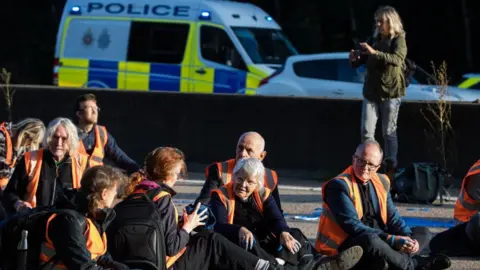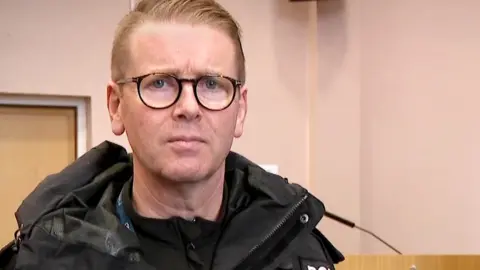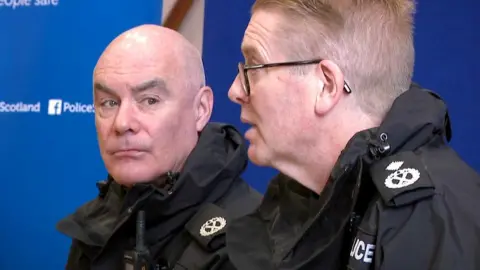COP26: Protesters who block major roads 'will be moved' by police
 Getty Images
Getty ImagesProtesters who block major roads during the UN climate conference in Glasgow will be moved and may face arrest, police have said.
Police Scotland said this would apply even if the COP26 protests are peaceful as they could be unlawful and unsafe.
Dep Ch Con Will Kerr told BBC Scotland officers have a "whole range of tactics" to use in such circumstances.
Although disruption is expected, DCC Kerr insisted emergency services would still respond to those who need them.
"Some protesters will inevitably try and block some roads. If it's not a main arterial route, we'll take a sensible proportionate approach to it," he said.
"If it's a main route, if it involves movement plans for the world leaders, if it involves major disruption to the life of the city, then we will move in and if the protesters won't move, we will remove them."

Asked how quickly the police would move people, he said: "It depends on how many people, what the environment is, but it also depends on how quickly we need to move for the safety of the protesters themselves.
"Running on to major roads to try and block it is a very unsafe thing to do. If we need to step in quickly, we will step in quickly."
The force said that because the UN actively encourages protest, certain groups have been accredited and assigned a time and venue to gather.
Police Scotland has met with a number of groups to discuss how the event will be policed, including Extinction Rebellion.
Assistant Chief Constable Bernie Higgins said there was "no one size fits all to protest".

"Some groups will do a lie in," he said. "If people want to go to George Square and lie down, crack on, because you're really not going to have much impact on the conference.
"If however you decide to try and shut the Kingston Bridge then that's really, really dangerous for yourself, it's really, really dangerous to other road users and potentially it would prevent ambulances responding to calls so we would move very swiftly to clear that area and it would result in arrests."
He added that police could put diversions in place if protesters block minor routes.
 Get Ready Glasgow
Get Ready GlasgowAbout 10,000 officers will be deployed each day to the conference in Glasgow next month, where around 120 world leaders and heads of state are expected to attend.
Every force in the UK will assist Police Scotland with operations, including British Transport Police, the Civil Nuclear Constabulary and Ministry of Defence police.
Specialist resources such as firearms officers, dog handlers, mounted branch, search teams and the marine unit will be used.
Significant events during the conference, running from 31 October to 12 November, include the two-day world leaders summit on 1-2 November and the youth event on 5 November.
Police Scotland also expect 100,000 people to attend a climate rally on 6 November in the city centre.
The style of policing throughout the event will be "friendly, fair and accommodating", according to the force.
In addition to road closures, DCC Kerr said there was potential for "further disruption" if pressure on agencies and services becomes "more acute".
However he stressed: "I can reassure the public that if they need an emergency response from us they will get it."
DCC Kerr added: "There's no straightforward, simple or single answer to the complex problem of tens of thousands of people and well over 100 world leaders moving about a city over a compressed period of time.
"Our principal and simple objective is relatively straight forward, to run a safe and secure environment in which the conference can take place. We are very confident the conference will take place in that secure environment."

The COP26 global climate summit in Glasgow in November is seen as crucial if climate change is to be brought under control. Almost 200 countries are being asked for their plans to cut emissions, and it could lead to major changes to our everyday lives.

